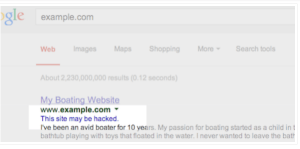Could You Have a Hacked Website?
 You’ve heard about cybersecurity and people who are able to break into a website. A hacked website results in loss of data, reputation and business. Could it happen to you?
You’ve heard about cybersecurity and people who are able to break into a website. A hacked website results in loss of data, reputation and business. Could it happen to you?
A Hacked Website is a Real Risk
Google says every day thousands of websites are hacked by cybercriminals. You may not realize for days or weeks that your site has been hacked.
In the worst cases it can make your domain serve nasty links to porn sites and download the kinds of stuff that makes you think the FBI is going to be busting through your door any second. If you serve that up to a lawyer when he arrives to your site and the odds are very strong that you can say goodbye to his business because it just says “I was not prepared and I got hacked.” It just doesn’t send the right kind of message from the get go.
You think, “My site is small. No one would bother it.” Wrong! Site attacks happen to everybody, even the smallest sites. They can be very intense with hundreds of attacks in one day and that burns up your hosting resources. It makes your site run slowly, but more than anything the biggest cost to the business owner is that it takes your focus away from your primary task, which is building your business. “An ounce of prevention is worth a pound of cure.”
It happened to me. My legal nurse consulting business website was hacked probably seven or eight years ago. One day, to my horror, I saw male sexual performance drugs being displayed on the homepage of the website. I immediately called my webmaster and asked him to close the door the hacker used to get onto the site. I was dismayed. Luckily none of my clients commented on it and we found it and shut it down within hours.
The experience made mes aware there are vulnerabilities that need to be closed. You need to have somebody who understands website security in charge of keeping those doors closed.

LNC Had a New Website That Was Hacked
It happened to an LNC I know. In her case, the hackers put a Trojan horse on her site. Why was it vulnerable? The site had been built with very basic usernames and very basic passwords. Once the hackers discovered this, they pushed in a Trojan horse which disseminated nasty code throughout her site.
Imagine an attorney visiting a site looking for an LNC, and instead sees child pornography videos. The hacker set up the site to infect everyone who came in contact with it. On top of that, the hackers hid a backdoor file in her files. If she attempted to clean the site, the backdoor file was actually going to reinstall the malware after a certain period of time.
A hacked website costs you money and time, creates a feeling of emotional violation, and can harm your reputation. Having current website security is the key to prevent a hacked website.
Learn more about what you can do about protecting yourself by listening to Debra Lloyd, a website expert, share her knowledge in our podcast, The Devastating Impact of a Hacked Website.
